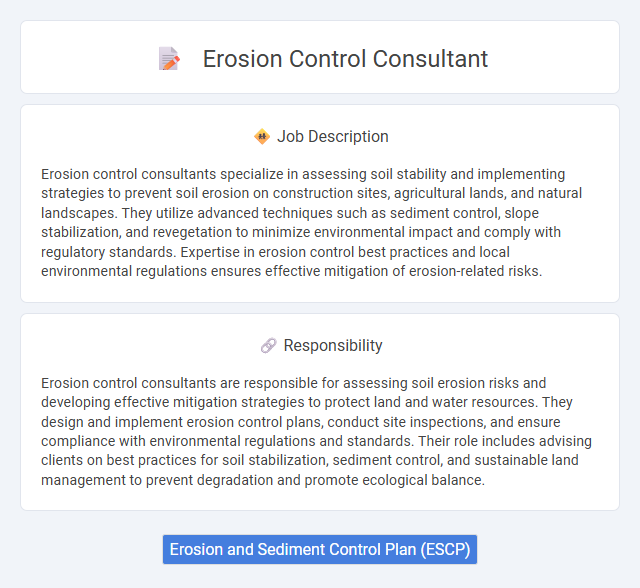
Erosion control consultants specialize in assessing soil stability and implementing strategies to prevent soil erosion on construction sites, agricultural lands, and natural landscapes. They utilize advanced techniques such as sediment control, slope stabilization, and revegetation to minimize environmental impact and comply with regulatory standards. Expertise in erosion control best practices and local environmental regulations ensures effective mitigation of erosion-related risks.
Individuals with strong analytical skills and a keen interest in environmental science are likely suitable for an erosion control consultant position. People who are comfortable working outdoors in varied weather conditions and can handle physical tasks may have a higher probability of success in this role. Those lacking attention to detail or a passion for sustainable land management might find this job less fitting to their skills and interests.
Qualification
An Erosion Control Consultant requires expertise in soil science, hydrology, and environmental regulations to develop effective erosion prevention strategies. Proficiency with erosion control best practices, sediment control technologies, and relevant software such as GIS enhances project accuracy and compliance. Certifications like Certified Professional in Erosion and Sediment Control (CPESC) and a background in civil or environmental engineering are highly valued qualifications.
Responsibility
Erosion control consultants are responsible for assessing soil erosion risks and developing effective mitigation strategies to protect land and water resources. They design and implement erosion control plans, conduct site inspections, and ensure compliance with environmental regulations and standards. Their role includes advising clients on best practices for soil stabilization, sediment control, and sustainable land management to prevent degradation and promote ecological balance.
Benefit
Hiring an erosion control consultant likely increases the probability of effectively managing soil erosion and preventing environmental damage on construction or agricultural sites. Their expertise can result in better compliance with regulatory requirements and reduce the risk of costly fines or project delays. Engaging a specialist in this field often leads to improved site sustainability and long-term cost savings through tailored erosion control strategies.
Challenge
Erosion control consultants likely face the challenge of assessing diverse environmental conditions that affect soil stability and water runoff. They probably need to develop tailored strategies that balance regulatory compliance with sustainable land use practices. Managing unpredictable weather patterns and site-specific variables may further complicate effective erosion mitigation efforts.
Career Advancement
Erosion Control Consultants specialize in managing soil erosion and sedimentation through innovative environmental solutions, playing a crucial role in sustainable land development and regulatory compliance. Career advancement in this field often involves gaining expertise in environmental regulations, advanced soil science, and hydrological modeling, leading to senior consultant or project management positions. Professionals can also progress by obtaining certifications such as Certified Professional in Erosion and Sediment Control (CPESC), increasing their value and leadership opportunities in environmental engineering firms and government agencies.
Key Terms
Erosion and Sediment Control Plan (ESCP)
Erosion Control Consultants specialize in developing and implementing Erosion and Sediment Control Plans (ESCP) to prevent soil degradation and water pollution on construction and development sites. They assess site conditions, design tailored control measures such as silt fences, sediment basins, and vegetation buffers, and ensure compliance with environmental regulations and permits. Effective ESCPs minimize sediment runoff, protect natural waterways, and promote sustainable land management practices.
 kuljobs.com
kuljobs.com